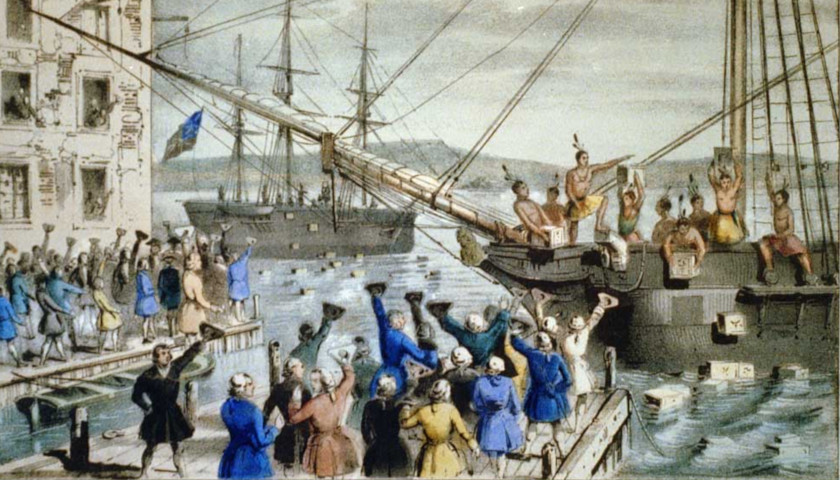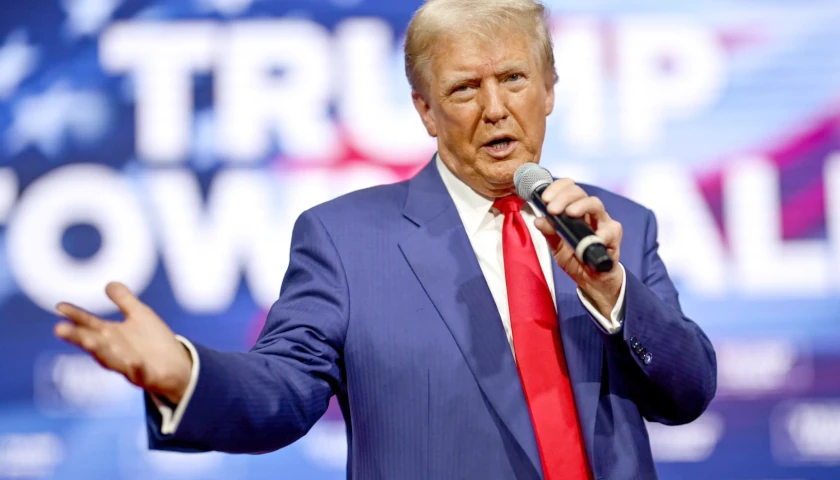by Jeffrey A. Rendall
While viewing news coverage of the recent protests in Paris over the French government’s tax hike on fuel it reminded me (a little) of our very own American citizen uprising over the government’s excessive and unpopular taxation policies of the 18th century.
Seeing as this is the time of year Americans celebrate Christmas – and are therefore intensely aware of pressures on family budgets – it’s also appropriate to remember the anniversary of the “protest” that started a populist wave, the legendary “Boston Tea Party.” December 16 marked the 245-year anniversary of the “party,” where highly agitated (and probably inebriated) Bostonians disguised as Indians raided East India Company ships at anchor and enthusiastically tossed the tea into the harbor. Tea and salt water don’t mix, so essentially the act of vandalism cost the Mother Country’s merchants tens of thousands of pounds of product.
And it got the British government very angry at the Americans. Lord North and parliament imposed martial law on the Bostonians, the colonies rode the slippery slope towards separation and independence and the rest is… history.
Whereas the citizens (some might call them anarchists) in Paris were allegedly upset over President Emmanuel Macron’s aloof “let them eat cake” attitude concerning popular opposition to the tax (imposed to offset the nebulous effects of climate change), they were primarily peeved about having to pay more for an everyday commodity that people need. The tax comes down heaviest on the poor, right? Yes, a populist uprising. We’re still digesting the lessons from our own anti-elitist demonstrations today, too.
Jay Cost wrote at National Review, “The Boston Tea Party’s lesson for contemporary readers might be styled cronyism and its discontents. Lord North was particularly solicitous of the East India Company’s fortunes because the government was all tangled up with this private business. As for the North American tea merchants who were more or less ruined by this act of favoritism, well, too bad for them.”
“The Boston Tea Party, in other words, is an illustration of the dangers of government favoritism. In the Anglo-American understanding of government, there is a broad expectation for equal treatment under the law. When the government ignores that, when it plays favorites to the well-connected and the wealthy, when it leaves other people on the outside looking in, it runs the risk of a popular uprising — a populist movement, if you will. And in many instances, the populist response to government inequity is not reasonable or high-minded because, to put it plainly, people are ticked off…”
“Governments today are still stubbornly insistent on micromanaging the economy, which inevitably entangles them with private interests. It is rare indeed to see the government create losers like Lord North did to the Boston tea merchants, but our government still likes to pick winners and losers in our economy and society.”
This is surely true, though the greater lesson is the “common” people really don’t like snobby elitists. The American revolution certainly involved passionate intellectual discussions and disagreements about the natural rights of man, the proper position of government vis-à-vis the people and the limits of the ruling class’s powers; but at its core it was a popular movement fired by people like the “Indians” who threw crates of tea into Boston Harbor. They were adamantly opposed to the British government taxing them without representation, but most of all, they were fired up because they hated being told what to do by an elite class they could neither see, hear, nor influence.
Protest is a human expression of grievances. The recent Paris rioters burned cars and spray-painted national monuments to vent their anger. Did it work? The French government pulled back the tax (or temporarily, apparently). This wasn’t to give the purveyors of violence their due, it was to provide the two sides more time to talk about it.
Here in America (and we’re not talking about Antifa) citizens usually do things a little more peacefully and sanely. Americans take advantage of constitutional rights to speak, assemble and petition the government. To oppose the government is as American as apple pie and baseball.
The same spirit that drove the Bostonians is alive today and explains the success of Donald Trump in the 2016 election. For years (first under Bill Clinton, then George W. Bush, then Barack Obama) the common folk were looked down upon and dictated to on issues such as trade and immigration. They watched powerlessly as foreigners took their jobs and invaded their communities while corporations (backed by the government) closed their doors and moved overseas to greener profit pastures fueled by cheap labor.
The Washington DC ruling class stood by silently as this was happening. Americans’ angst and anger was first expressed by the national (ironically named) Tea Party movement in 2010, which began based on the rant of CNBC’s Rick Santelli (raging against federally subsidized mortgages) and spread like wildfire when ordinary citizens groups rose up to express their views on Obamacare’s passage.
The corrupt Obama administration instantly recognized the threat and tasked the IRS with making life difficult for these grassroots organizations to receive tax exempt status. If this wasn’t a terrific example of elites overstepping their authority — we should be surprised people didn’t toss the IRS’s computers into the Potomac River.
But conservatives don’t do such things. Peaceful protest is our forte — and also letting our voices be heard through the ballot box.
The struggle continues as President Trump threatens to close the government’s doors (or a small percentage of it) if the “people’s representatives” won’t grant the funds necessary to protect the nation. Democrat elites insist a border wall isn’t necessary and are more than willing to let the people suffer in order to preserve their own power. Is this really all that different than what transpired in Boston (and other places) in 1773?
Hardly. Trump was successful in modern politics because he sensed the same type of torment existed “out there” among the people; but instead of wielding pitchforks and torches the ordinary folks sent a message to the ruling elites in the form of a populist rebellion whose leader promised to put their interests first — and he’s kept his word. They’re fighting back fiercely.
Now Trump’s leadership is threatened by elites who want to impeach him — or at the very least, stop him from doing the will of those who elected him. They’re using a variety of excuses to accomplish their sinister aims — that Trump was illegitimately elected (through Russian collusion and more recently, because he committed campaign violations by paying off women who were blackmailing him), or his behavior is unpresidential and embarrassing.
Does this mean he’s in trouble? Certainly, the #NeverTrump faction thinks so. Dedicated #NeverTrumper David French wrote at National Review, “Campaign-finance law is constructed from the ground up to require candidate transparency and guard against corruption. Thus, it is purposefully very hard for candidates to find a way to legally and quietly use substantial sums of money to cover up dirty deeds. In his essay, Smith argues, ‘Indeed, it is quite probable that many of those now baying for Trump’s scalp for illegal campaign contributions would be leading a charge to prosecute Trump for illegal ‘personal use’ of campaign funds had he made the payments from his campaign treasury.'”
“That’s likely correct — and evidence that campaign-finance law is working as intended. In other words, if you’re a campaign-finance lawyer, and a candidate asks your advice on how to buy the silence of a porn star and hide that payment entirely from the American people, your best response should be, ‘Have you considered not running for office?'”
“To be clear, I happen to disagree with many elements of the campaign-finance regulatory regime. Its mandatory-disclosure provisions expose ordinary American citizens to reprisals for public participation. But when a candidate’s behavior runs against the plain language and clear intent of applicable law, he should not be shocked when he pays a legal price.”
Yes, Trump perhaps would pay a legal price, but it’s also important to consider there’s a well-respected line of thought suggesting a sitting president cannot be sued or indicted while in office. Even if this argument failed to protect him, any proceedings would amount to a he-said/she said battle between two sides where there’s no reliable evidence to back up their claims.
What if Trump said he directed the payments to spare his family embarrassment from a very public scandal at a time when they were already under the media microscope for every imaginable blemish? Is this unreasonable? In Trump’s case, he ran for office to bring a new perspective and a lifetime’s worth of know-how to a badly broken and tarnished executive branch. It’s hard to see how giving money to a couple bimbos to keep their mouths shut is really furthering that mission, especially when Trump’s extra-marital dalliances were already the subject of public record and comment.
Such salaciousness didn’t make a difference in Bill Clinton’s case, and he even committed the acts while in office (literally), so why would a different level of scrutiny be applied to Trump for something that allegedly occurred a decade before he even ran for the presidency?
Aside from this, the prosecution’s star witness (Michael Cohen) has already pleaded guilty to lying to government authorities, so how credible would he be at trial? And what about the attorney-client privilege? Would Cohen even be allowed to testify against Trump? It certainly seems like this scenario leaves considerable room for interpretation. French and the #NeverTrumpers assume Trump’s guilty of something, so they’re checking every nook and cranny seeking the magic silver bullet.
When it comes down to it, Trump shouldn’t be in trouble in either a legal or political sense. Impeachment is a political process where the House brings articles of impeachment alleging high crimes and misdemeanors and the Senate sits in judgment if the president is formally charged. Democrats aren’t the wisest sticks in the stack but even they can count. The political spectacle surrounding House deliberations over Trump’s alleged payments to a porn star won’t hold the public’s attention and approval after everything that’s happened.
Trump calls it a “witch hunt” — and that’s exactly what it is.
But even if the House were audacious enough to impeach Trump there’s no way he’d be convicted in the Senate. With 53 Republicans in the upper chamber, even if a few RINOs voted yes, you’d still need all the Democrats plus 20 Republicans to convict and remove Trump from office. There’s a better chance of a snowball surviving in Arizona summer heat than that ever materializing.
Never say never in politics — but one would surmise at least a few Democrat senators would pause before voting to impeach Trump overpayments to a woman who goes by the name of “Stormy.” The world is falling apart (in places) and puritanical Democrats worry about trivial matters in the president’s (long) past private life. Aren’t they always complaining about America’s image abroad? How do foreigners view this circus? Why aren’t Democrats worried now?
Will China stop buying American soybeans because of Trump’s affairs? Will Kim Jong-un ramp up his nuke program again because the American president used to be a philanderer?
It’s funny, in the days of #MeToo where women literally burst out of hiding spaces to accuse men of just about everything — including beer bashes and sloppy groping thirty-something years ago — none of these accusers ever claimed mistreatment by Trump. Does it matter? Should it?
For what it’s worth, Trump recently predicted the country would revolt if it ever came down to impeaching him — and he’s right. Robert Donachie reported at The Washington Examiner last week, “President Trump said Tuesday night he is not concerned about getting impeached when Democrats take control of the House next year and argued ‘people would revolt’ if they tried.”
“It’s hard to impeach somebody who hasn’t done anything wrong and who’s created the greatest economy in the history of our country,” Trump told Reuters Tuesday evening, repeating a frequent claim based on strong economic indicators.
“I’m not concerned, no,” he said. “I think that the people would revolt if that happened.”
Even if Trump were anxious about the Democrats’ aims he’d never let on to the media. Can you imagine the stories generated from such a confession? How about, “Trump dreads impeachment when Dems take over,” or “For Trump, it’s a question of when — not if — for impending impeachment judgement day.”
Incoming Speaker Nancy Pelosi will follow the polls closely to see whether there’s popular support to parade Trump before the public on flimsy impeachment grounds. Democrats remember how Republicans suffered at the ballot box after 1998’s Clinton impeachment fiasco — and they’ll want to hold onto their majority at all costs.
Anti-populist movements don’t tend to succeed… and Trump is still popular with his base supporters. Democrats won’t change it by impeaching him.
When government oversteps its bounds there’s invariably a popular uprising to combat it. Be it the Boston Tea Party in 1773, the modern-day Tea Party movement or this year’s anti-gas tax protests in Paris, the people don’t take it kindly when political elites dictate and condescend.
– – –






Corkers office is closed today. The Senate stabbed us in the back in the middle of the night and headed home.
Jim Born
There have been reports on the national news—I have no idea if they are true—that Bob Corker has already left Washington to drive back to Tennessee, and he has reportedly stated that when he gets home HE IS NOT RETURNING TO THE CAPITOL TO VOTE on the bill that the U. S. House approved last night (12-20-18) to provide $5B in funding to construct the border wall that the President wants. I hope that this report is just more FAKE NEWS.
But, if this report is truly how Corker ‘feels’ about this (given that the Republicans only hold a 51 vote to 49 vote margin in the U. S. Senate), then Corker should resign his seat today (12-21-18)—both Governor Haslam and Governor-Elect Lee should prevail upon Corker to do this—so as to allow Governor Haslam to immediately appoint Senator-Elect Blackburn to his vacant seat (and this will also have the added benefit of giving her, and Tennessee, a few days of seniority over the other incoming newly-elected Senators) so that the people of Tennessee will be fully represented when the Senate vote on this all important bill is held later today or tomorrow. The President must have the money that he needs to build the wall on our country’s southern border!